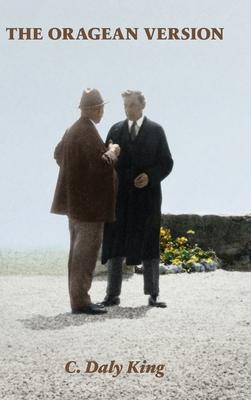With what is this book concerned?
"Primarily with the destiny of Man and with that of individual men, with their genuine human functions and the obstacle that prevents the fulfillment of them, and with those procedures that may hold out promise of being used effectually to alter the situation. This was the sort of thing taught in the ancient Mysteries, now mostly lost and almost entirely unintelligible because the key of those teachings has vanished. . . . But the same verities, to which they pointed, shall be our subject too; for the truth, if genuine, is unique and single. But the terms presently to be defined, will be modern terms and thus more readily comprehensible to the contemporary reader."
A. R. Orage, editor and owner of the famous avant-garde magazine The New Age, met the Russian journalist P. D. Ouspensky in 1914 in London. Both men were deeply interested in spiritual matters and corresponded in the following years. During this time, Ouspensky met G. Gurdjieff and became his pupil. Driven by the Russian Revolution, Ouspensky, after many adventures, arrived in London in 1921, and began giving lectures on the Gurdjieff-system. Orage attended his lectures and realized that Ouspensky had found what both had been looking for. But, after Gurdjieff's first visit to Ouspensky's group, he knew that Gurdjieff was the teacher. Eventually, he gave up everything, sold The New Age, and went to Fontainebleau.
Orage attended Gurdjieff's Institute in Fontainebleau from October 1922 until December 1923 when he was sent to New York by Gurdjieff to prepare for his first visit and demonstrations of sacred dances. With the intention to open branches of the Institute in America, Gurdjieff left Orage in New York to continue what had been begun. But in 1924 Gurdjieff suffered a serious car accident which forced him to revise all his plans. He decided to transmit his knowledge in written form with Orage as his editor and collaborator. From 1924 to 1931, Orage held regular meetings in New York to explain the nature of the Institute and its work. It was at one of these meetings in the fall of 1924 that C. Daly King first met Orage.
What impressed King most, was the complete and utter rationality of what he heard. This was contrary to what he had expected-a proselytizing harangue for a bogus cult. The topics went to the real heart of what had always intrigued him, and from then on he regularly attended Orage's meetings.
By the following fall, King was already conducting two groups of his own, and in his absence, Orage even appointed King as his deputy. They had formed a close friendship, which gave King the opportunity to discuss with Orage all the details of the system.
All this came to an end, when between 1930-1931, Gurdjieff staged the repudiation of Orage which led to Orage's return to England. His New York groups were abandoned, and three years later, Orage died suddenly and unexpectedly on 6 November 1934.
Gurdjieff made his last trip to America at the end of 1948. King attended two of his meetings, and realized that the Oragean version of the teaching no longer remained extant, and that it was upon the verge of being irrecoverably lost. He therefore resolved to set it down in accurate detail, the result of which, is the present volume.
Fully indexed with over 40 redrawn illustrations and corrected errata.
